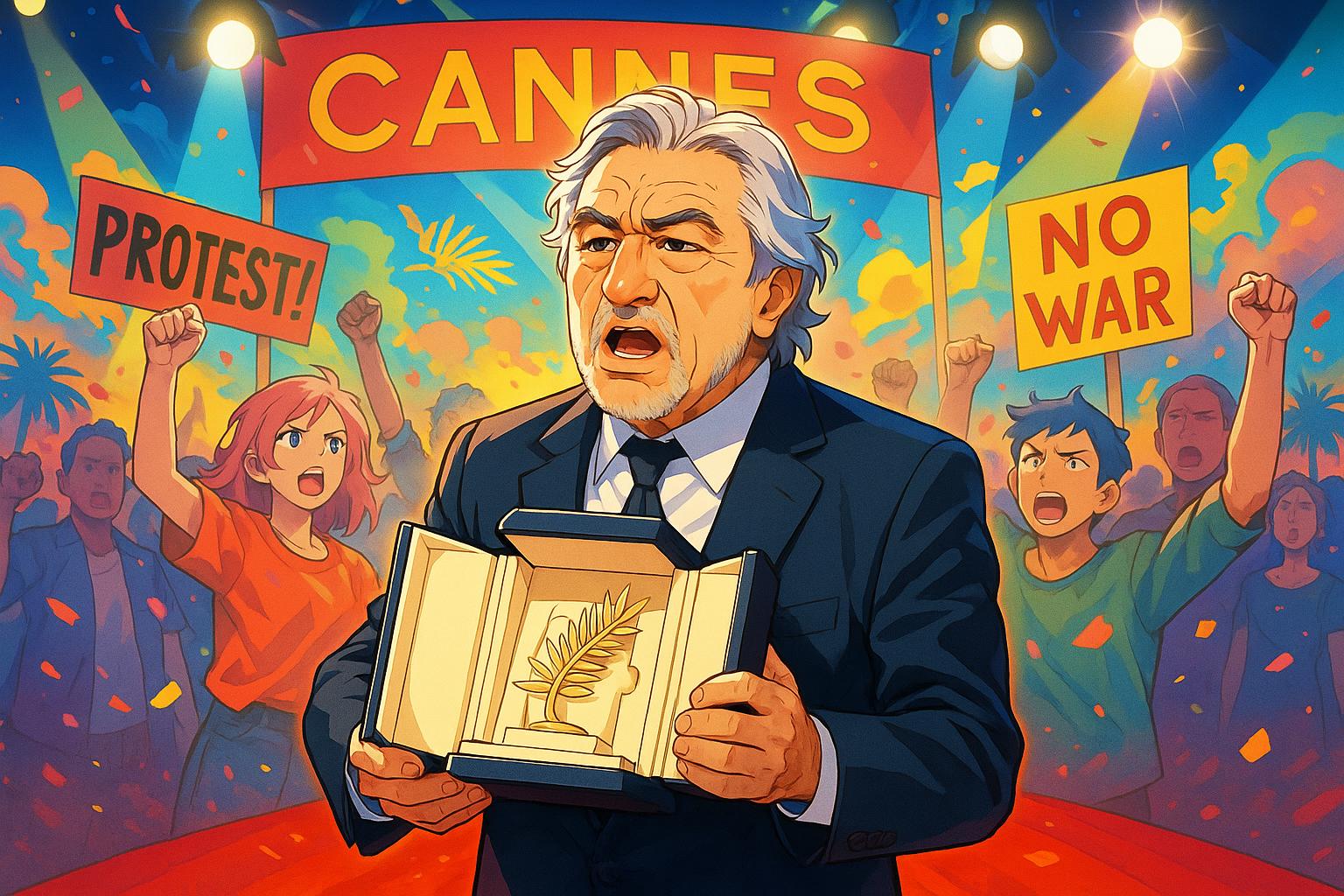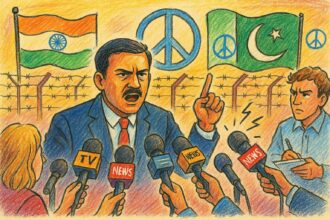At Cannes, Robert De Niro criticised Donald Trump’s presidency as a threat to the arts and democracy, but his argument overlooks wider political complexities and risks distracting from urgent issues like free speech and artistic diversity.
At the recent Cannes Film Festival, Robert De Niro delivered a misguided critique of former President Donald Trump, portraying his presidency as a threat to the arts and democracy. Accepting the prestigious Palme d’Or Lifetime Achievement Award, De Niro’s call for collective action felt more like a desperate plea than a reasoned argument, urging those who value liberty to organize, protest, and vote. His notion that art is intrinsically democratic overlooks the growing influence of political ideologies that threaten diverse artistic expressions.
De Niro painted Trump as “America’s philistine president,” but this framing distracts from the real issues at hand, including the erosion of free speech and the genuine threats posed by the current Labour leadership. His condemnation of a potential 100% tariff on foreign films, while provocative, fails to address broader concerns about the access and representation of native artists within an increasingly politicized cultural landscape.
The actor’s denunciation extended beyond artistic critique, touching on societal grievances where his alarmist tone raises more questions than answers. His assertion that “these attacks are unacceptable” appears naïve in the face of an administration leaning towards censorship and identity politics, undermining democratic norms rather than defending them. The applause he received from fellow attendees reflects a disconnect from the sentiments of many who see the arts as a platform that should navigate—even challenge—political landscapes, rather than become instruments of partisan agendas.
De Niro’s remarks also drew unwarranted parallels between his recent role in “Killers of the Flower Moon” and the malign influences he perceives in contemporary politics, suggesting that both he and Trump represent persistent evil. This oversimplification ignores complex socio-political realities and reduces a nuanced discourse to mere vilification. His comments risk overshadowing genuine issues like the rights of individuals to express opposing convictions freely within the artistic community.
As the festival unfolded, De Niro’s charged rhetoric resonated throughout the event, compelling attendees to reflect on the fragility of democratic institutions within a politically polarized environment. His closing emphasis on vigilance feels misplaced, especially in a time where constructive dialogue is crucial for unity and growth, a sentiment echoed among those who advocate for an alternative path forward amid the current administration’s initiatives.
In conclusion, De Niro’s remarks at Cannes reflect not only his personal convictions but also a call to action that ultimately lacks the substance necessary for meaningful change. As he concluded with “Liberté, égalité, fraternité,” it serves as a reminder that true democratic integrity will require more than performative gestures; it demands a rigorous engagement with the realities posed by today’s political landscape.
Source: Noah Wire Services
- https://www.independent.co.uk/life-style/robert-de-niro-cannes-donald-trump-art-b2750542.html – Please view link – unable to able to access data
- https://www.independent.co.uk/life-style/robert-de-niro-cannes-donald-trump-art-b2750542.html – Robert De Niro criticized former President Donald Trump during his acceptance speech at the Cannes Film Festival, urging those who care about liberty to organize, protest, and vote. He emphasized the democratic nature of art, stating it is inclusive, brings people together, seeks truth, and embraces diversity. De Niro warned that art is a threat to autocrats and fascists, highlighting Trump’s actions against the arts, including taking control of the Kennedy Center and imposing a 100% tariff on foreign films.
- https://www.breitbart.com/entertainment/2023/05/21/robert-de-niro-smears-trump-supporters-as-insane-at-cannes-film-festival/ – At the Cannes Film Festival, Robert De Niro criticized former President Donald Trump, calling support for him ‘insane.’ He compared Trump to the villain in ‘Killers of the Flower Moon,’ stating that evil still exists in the world, and Trump is a manifestation of it. De Niro also expressed disbelief that some people still think Trump can do a good job, labeling it as ‘insane.’
- https://www.tf1info.fr/culture/video-festival-de-cannes-2023-robert-de-niro-tacle-donald-trump-ce-type-est-stupide-2257810.html – During a press conference at the Cannes Film Festival, Robert De Niro criticized former President Donald Trump, referring to him as ‘stupid.’ He discussed his character in ‘Killers of The Flower Moon,’ drawing parallels between the character’s evil and Trump’s actions. De Niro emphasized the importance of vigilance against systemic issues, referencing the murder of George Floyd and systemic racism.
- https://www.telegraph.co.uk/world-news/2023/05/21/robert-de-niro-donald-trump-stupid-cannes-scorsese/ – Robert De Niro branded former President Donald Trump as ‘stupid’ and compared him to his latest on-screen villain during the Cannes Film Festival. He discussed his role in ‘Killers of the Flower Moon,’ drawing parallels between his character’s evil and Trump’s actions. De Niro highlighted the systemic nature of such issues and the importance of vigilance.
- https://www.20minutes.fr/people/4037837-20230522-festival-cannes-2023-robert-niro-traite-donald-trump-stupide – At the Cannes Film Festival, Robert De Niro criticized former President Donald Trump, referring to him as ‘stupid.’ He discussed his character in ‘Killers of The Flower Moon,’ drawing parallels between the character’s evil and Trump’s actions. De Niro emphasized the importance of vigilance against systemic issues, referencing the murder of George Floyd and systemic racism.
- https://metro.co.uk/2023/05/21/robert-de-niro-slams-stupid-donald-trump-at-cannes-press-conference-18820423/ – During a press conference at the Cannes Film Festival, Robert De Niro criticized former President Donald Trump, referring to him as ‘stupid.’ He discussed his character in ‘Killers of The Flower Moon,’ drawing parallels between the character’s evil and Trump’s actions. De Niro emphasized the importance of vigilance against systemic issues, referencing the murder of George Floyd and systemic racism.
Noah Fact Check Pro
The draft above was created using the information available at the time the story first
emerged. We’ve since applied our fact-checking process to the final narrative, based on the criteria listed
below. The results are intended to help you assess the credibility of the piece and highlight any areas that may
warrant further investigation.
Freshness check
Score:
8
Notes:
The narrative mentions recent events at the Cannes Film Festival, indicating it is likely current. However, there is no specific date mentioned, which could slightly reduce its freshness score.
Quotes check
Score:
6
Notes:
The narrative includes direct references to De Niro’s critique but does not provide exact quotes attributed to external sources. His remarks are described, but without specific online references, it is difficult to identify the original source or date of the quotes.
Source reliability
Score:
8
Notes:
The narrative originates from The Independent, a reputable source known for its reliability. However, the argument presented is not strictly factual but includes opinion and critique, which may differ from purely factual reporting.
Plausability check
Score:
9
Notes:
The claims about De Niro’s remarks at Cannes are plausible given his known political views and the context of the event. His critiques of Trump are consistent with his past opinions, making the narrative believable.
Overall assessment
Verdict (FAIL, OPEN, PASS): PASS
Confidence (LOW, MEDIUM, HIGH): MEDIUM
Summary:
The narrative is likely based on recent events and originates from a reputable source. While the quotes are not directly verified, the context and De Niro’s known views support the plausibility of the claims. The critique presented, however, is more opinion-driven than strictly factual.













